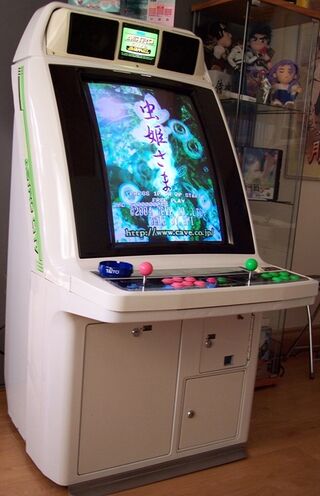Difference between revisions of "Astro City 2"
From Sega Retro
| Line 15: | Line 15: | ||
==Promotional material== | ==Promotional material== | ||
| − | |||
| − | |||
| − | |||
| − | |||
==Physical scans== | ==Physical scans== | ||
{{ScanArcade | {{ScanArcade | ||
| Line 25: | Line 21: | ||
| region=JP | | region=JP | ||
| manual= | | manual= | ||
| + | }} | ||
| + | {{ScanArcade | ||
| + | | type=upright | ||
| + | | console=Arcade | ||
| + | | region= | ||
| + | | manual=SegaAstroCity2Manual.pdf | ||
}} | }} | ||
{{clear}} | {{clear}} | ||
{{cabinets}} | {{cabinets}} | ||
Revision as of 12:47, 6 October 2016
| Astro City 2 | |||||
|---|---|---|---|---|---|
| Developer: Sega | |||||
|
The Astro City 2 (アストロシティ2) is a multi-purpose arcade cabinet manufactured by Sega in 1993 as an update to the Astro City cabinet.
Astro City 2s are almost identical to ordinary Astro City cabinets from the outside, though there are some minor cosmetic differences and better compatibility with the Sega Model 1 board. It was initially released as a dedicated cabinet for Virtua Fighter in Japan.
Other minor differences include a superior speaker system and power supply, as well as different default joysticks.
Promotional material
Physical scans
| Arcade, JP | ||||
|---|---|---|---|---|
| Multi-Purpose Arcade Cabinets Created by Sega |
|---|
| Upright/Sit-down |
| City (1986) | Aero City (1988) | Swing (1991) | Astro City (1993) | Astro City 2 (1993) | New Astro City (1994) | Blast City (1996) | NAOMI Universal Cabinet (1999) | Net City (1999) | New Net City (xxxx) | Lindbergh Universal Cabinet (2007) |
| Versus City (1996) | New Versus City (199x) |
| Large |
| Megalo 50 (1992) | Super Megalo (1993) | Euro Megalo (199x) | Super Megalo 2 (1994) | Megalo 410 (1996) | NAOMI DX Universal Cabinet (200x) |
| Cocktail |
| T-13 (1983) | Aero Table (1988) |
